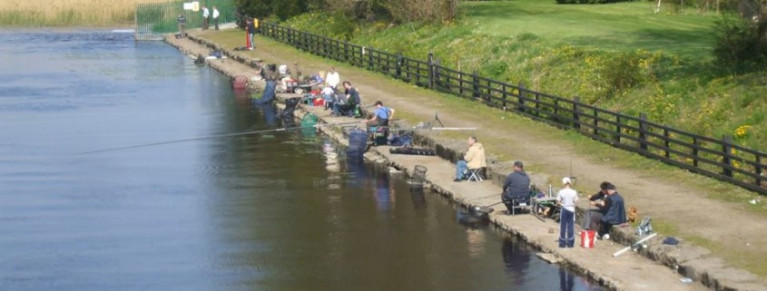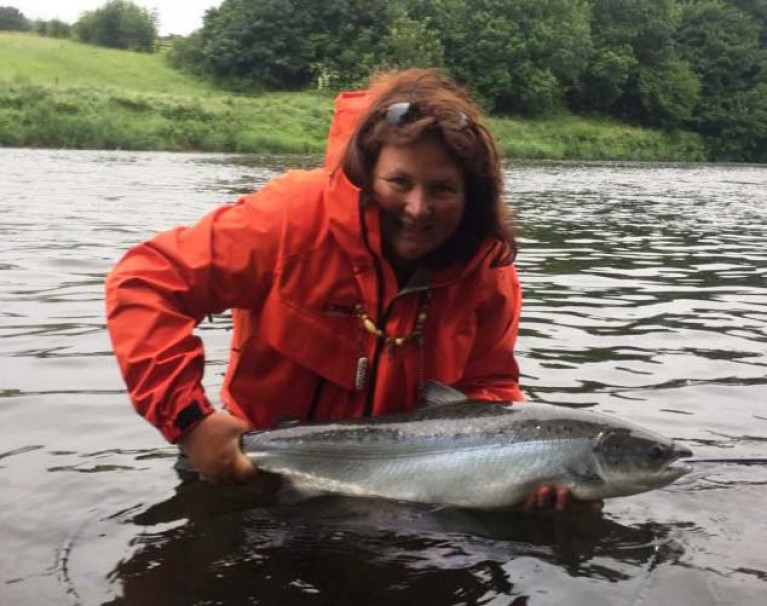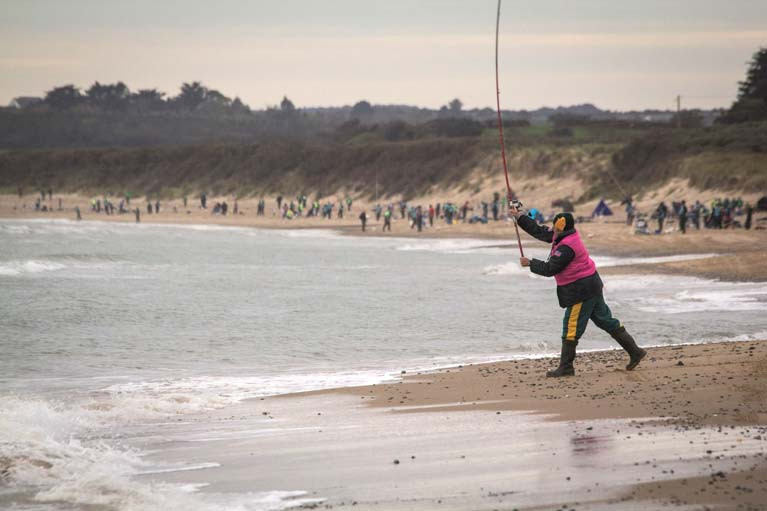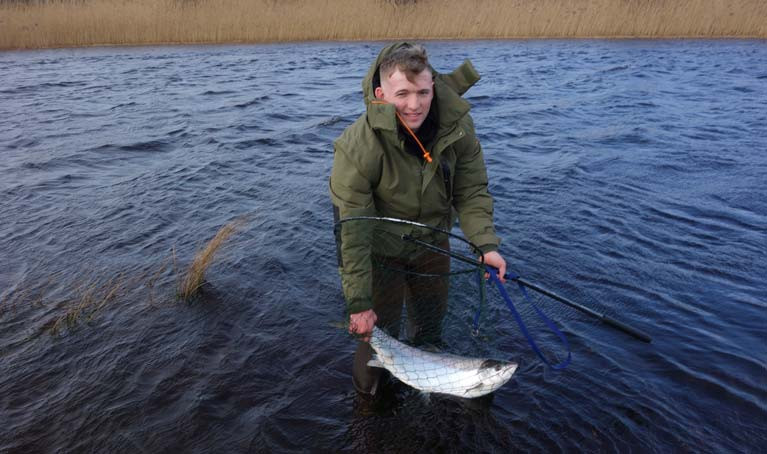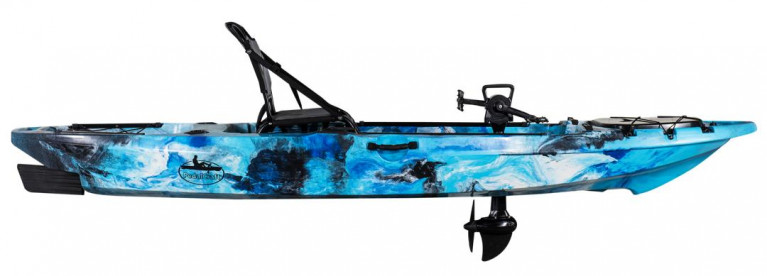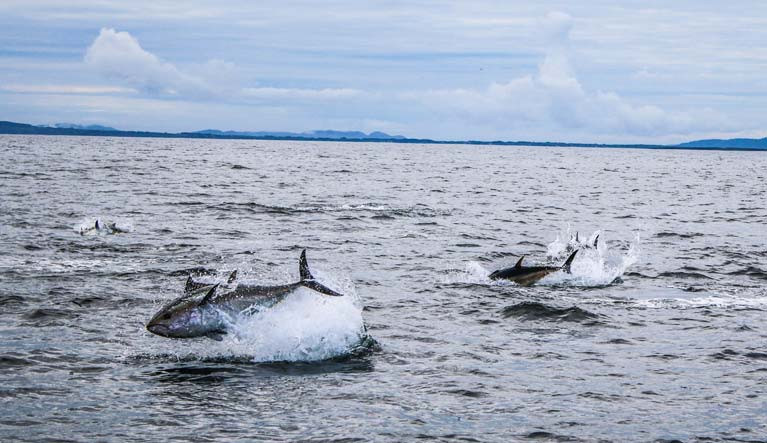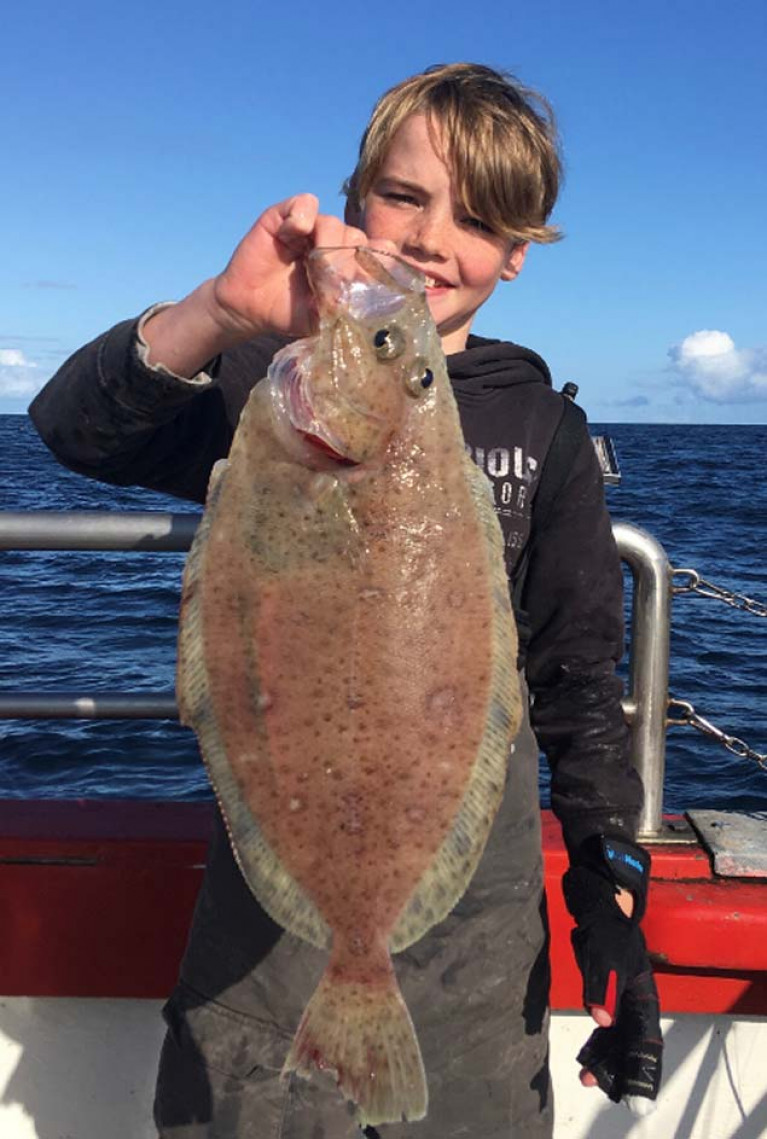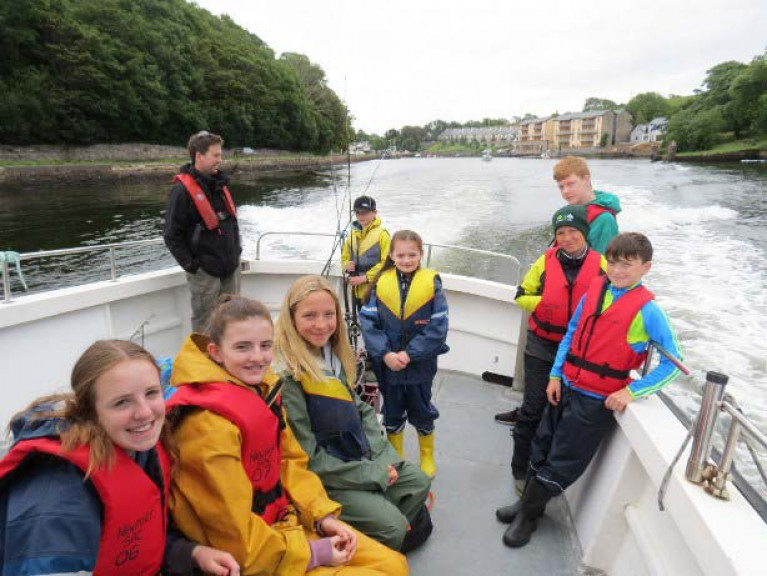Displaying items by tag: angling
Inland Fisheries Ireland has updated its advice regarding angling to reflect the latest Government and NPHET advice.
As and from May 6th anglers may fish in a location less than or equal to 5 km from home. Further guidance is available here
Open Fisheries
IFI owned/managed state fisheries are open with the exception of the Galway and Moy fisheries.
ESB fisheries are now also open.
The status of private and club run fisheries is a matter for the fishery manager/committee.
Inland Fisheries Irelands will continue to monitor the situation and make further updates as appropriate in line the Government's Roadmap for reopening society and business.
Updated guidelines where travel to fish is permitted
- Fishing is permitted within 5km of your home
- Maintain social distancing at all times, especially at car parks, access points and launch sites.
- Anglers* should not share transport e.g. car/van when travelling to fish.
- Limit contact with other anglers and providers.
- Permit/licence sales online where possible
- Max. 2 persons* in small boat for inland/inshore fishing
- Angling businesses may only open once classified as an essential service and should only operate if they can provide online/contactless services.
- Charter fishing or guided fishing may only operate where skippers/guides can guarantee compliance with social distancing measures.
- Recommend no competition fishing
- Facilities where anglers could gather to remain closed – lunch huts, etc.
- Where such facilities at 10 above are essential fishery should remain closed.
- Recommend anglers/guides/skippers to carry hand sanitiser and to use it after touching surfaces such as gates, stiles, pier railings, ladders, etc.
* Assumed to be individuals from different households.
'Women Try Fishing' Campaign is Launched
This week International Women’s Day is demanding a lot of attention worldwide. In the shipping industry, a campaign has been launched in the UK to achieve ‘gender balance in the industry’. Here in Ireland, sailing ladies have their WOW group – I like that description – for Women on the Water.
This week the State agency for inland waters, estuaries and angling has launched a campaign to introduce women to angling.
Angling is described as the biggest participant sport in Ireland and that includes the marine sector, my Podcast guest this week is Myles Kelly from Inland Fisheries Ireland. It has just launched its WTF project – ‘Women Try Fishing’ programme.
This will involve more than twenty events to give women the opportunity to try fishing. Renowned angler and one of the world’s leading fly casting instructors, Glenda Powell of Blackwater Salmon Fishery in County Cork will give training at various venues around the country between April and September of this year.
So, on my Podcast below Myles Kelly outlines why and how women are going to be given this exclusive opportunity – exclusive from men of course!
Appeal to Irish Sea Anglers to Contribute to Marine Research
Sea anglers can now play a key role in the conservation and management of marine fish stocks. A new survey programme; The Irish Marine Recreational Sea Angling Survey (IMREC), will see Inland Fisheries Ireland gather information regarding recreational catches of fish along the coast and at sea. Data collected from the survey will improve the management of stocks and support conservation efforts thereby contributing to increasing the availability of fish to sea anglers in the future.
Following new legislation from the European Commission which requires EU member states to collect and report data on recreational catches, Inland Fisheries Ireland has established this new programme which will give a clear picture of how fishing activities relate to stock levels. The sea angling survey will provide data which will inform knowledge around trends in stock levels and the sustainability of key species.
A sea angling diary app is currently in the development stage. The app will allow anglers to share and compare catch data with fellow participants. There will also be monthly prizes for active participants.
Dr Ciaran Byrne, CEO of Inland Fisheries Ireland said: “Sea angling is an important activity in Ireland with social, recreational and economic benefits for coastal communities. There are approximately 126,000 anglers participating in the sea angling fishery in Ireland and we are now hoping they will help us establish how often people go fishing, what they catch and what they release.
This information will tell us how sea angling contributes to the economy in Ireland and how we can best manage the marine fisheries resource for all. If we have strong evidence and verifiable data around fish stocks then we can make informed management decisions, rather than having to take a worst-case view which is often what happens where there are large uncertainties in terms of data.”
For more information about the survey programme, visit here where you can read a full FAQ guide and if you are interested in partaking in the programme you can register to be put on the mailing list.
Two men have recently appeared in court on charges relating to illegal net fishing for salmon on the lower River Nore. On Tuesday, 18th of February Mr Brian Murphy and Mr Martin Barron appeared in front of judge Geraldine Carthy at Kilkenny District Court in respect of breaches of fisheries legislation on the River Nore which occurred on the 15th of July 2019.
Fisheries Officer John Cullen outlined the facts of the case to the court and how officers used a mobile scout camera (cctv) to capture video and still images of both men using a net and a cot (small wooden boat) to illegally catch eight wild salmon. The place in which the incident occurred is a remote area on the tidal section of the River Nore, approximately eight kilometres downstream of Inistioge, Co Kilkenny.
Judge Carthy commented on how she considered the significant nature of the offence but also took into account the good character references for both defendants and the fact that they have no previous convictions. Judge Carthy imposed fines and costs totalling €1500 to each of the two men.
David Mc Inerney, Director of the South Eastern River Basin District at Inland Fisheries Ireland said: “Our fisheries officers patrol the waterways in overt and covert operations day and night with the aim of protecting and conserving our precious salmon stocks and valuable fisheries resource using a range of technologies. This conviction highlights that illegal salmon fishing will not be tolerated and is a serious environmental crime.
The River Nore has been closed to the harvesting of salmon since 2014 and the river is only open on a catch and release basis for salmon angling since 2014. There has been a significant decline in salmon stocks in recent years and the River Nore is significantly below its conservation limit, which indicates that every effort needs to be made to conserve this fishery. ”
First Catch & Release Salmon of 2020 Caught in Leitrim
The first catch and release salmon of 2020 has been caught on the River Drowes in Co. Leitrim according to Inland Fisheries Ireland. Nash Mc Daid, of Ballybofey, Donegal landed the first catch and release salmon at the “point of the meadow” on the River Drowes at 2.45pm, Friday the 14th of February. The salmon, which weighed approximately 12 pounds, was caught on a Red Flying C before being released into the water.
In 2019, the first salmon was recorded on the Lackagh River in Donegal on the 1st of January and in 2018, the first salmon was recorded on the River Drowes in Leitrim on the 30th of January. This year the first salmon caught was in Waterville in Kerry on January 25th.
Inland Fisheries Ireland awarded €250 prize money to the angler for the first catch and release salmon of the New Year. The prize was only eligible for the release of the first salmon which was handled correctly and verified by Fisheries Officers.
Dr Ciaran Byrne, CEO of Inland Fisheries Ireland said: “I would like to congratulate Nash Mc Daid, on the first catch and release salmon of 2020. I would urge anglers to step up their conservation efforts and engage in catch & release angling in 2020. Last year we celebrated the International Year of the Salmon and its main aim was to raise awareness of the many challenges facing salmon stocks across the Northern hemisphere.
Salmon populations have plummeted in recent years with the number of salmon returning to Irish shores decreasing by over 70 per cent, which is very concerning. I would like to take this opportunity to encourage all anglers in 2020 to ensure their own personal contribution to the conservation of salmon by practising catch and release fishing. Inland Fisheries Ireland will continue to support salmon conservation through research, protection, habitat conservation and development of our precious resource.”
The River Drowes is open for fishing during the 2020 season. The regulations for the management of the wild salmon and sea trout fishery for 2020 including the list of open, catch and release and closed rivers can be found at: https://www.fisheriesireland.ie/Salmon-Regulations/salmon-regulations.html#tab2.
Inland Fisheries Ireland is also inviting the public to help protect and conserve the fisheries resource during the year by reporting incidents to its confidential hotline number 1890 34 74 24 or 1890 FISH 24. The phone line is designed to encourage the reporting of incidents of illegal fishing, water pollution and invasive species.
Angling Kayaks Go on Display by O’Sullivan’s Marine at Ireland Angling Expo
O’Sullivan’s Marine will be displaying some of the “best value” angling kayaks in Ireland at this year’s Ireland Angling Expo in the National Show Centre, Swords, Dublin on 15th & 16th February 2020.
ANGLING & RECREATIONAL KAYAKS TO SUIT ALL LEVELS AND BUDGETS
RECREATIONAL: on display
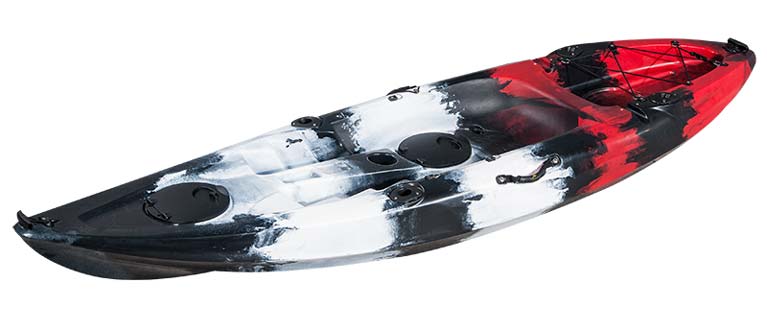 The Conger kayak
The Conger kayak
CONGER
The Conger is a compact single sit-on-top fishing kayak that is stable, light and easy to handle. Four internal fishing rod holders, a large storage area at the rear and 2 waterproof round hatches with bag inserts to secure your gear. The Conger kayak is a well-featured starter kayak at a very reasonable price.
 The Rodster kayak
The Rodster kayak
RODSTER
The Rodster is a neat compact fishing kayak that tracks beautifully through the water due to its sleek bow design and is extremely stable due to the 84cm wide hull. Equipped with a comfortable aluminium-frame raised seat and plenty of storage areas for your catch and equipment. 4 internal flush-mounted rod holders and deep fishing pod console in the centre. Hands-free rudder system available as an optional extra.
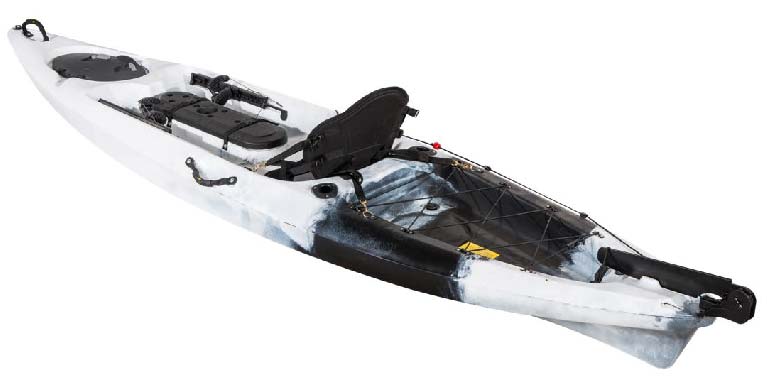 The Dace Pro
The Dace Pro
PROFESSIONAL ANGLING KAYAKS:
Professional angling kayaks on display include The Dace Pro 10’, 12’ and 14’ as well as the Big Dace Pro 13’. Packed to the gills with fishing features, and everything needed for a comfortable and productive outing for professional fishermen and women.
These kayaks are extremely well-featured and offer the perfect combination of stability, speed, manoeuvrability and straight-line tracking.
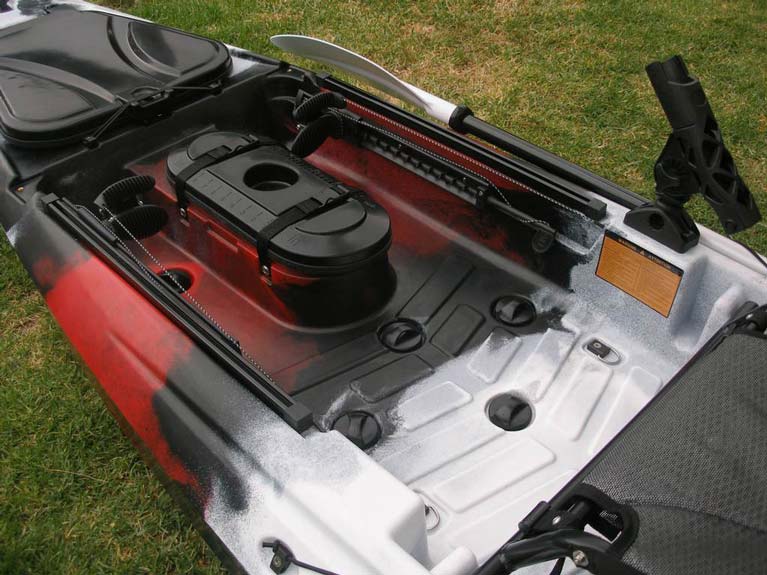 Big Dace Pro Angler 13
Big Dace Pro Angler 13
TANDEM AND 1 + 1 KAYAKS
For those who want to share the fun, O’Sullivan’s Marine also offer the GLIDE 1 + 1, which has room to bring a small passenger in front of the paddler, along with the OCEANUS (2.5 p) and the CASTOR DOUBLE KAYAK - boasting a huge load carrying capacity of 300kg and extra-wide seating area, perfect for a fishing trip for two!
TARPON PROPEL
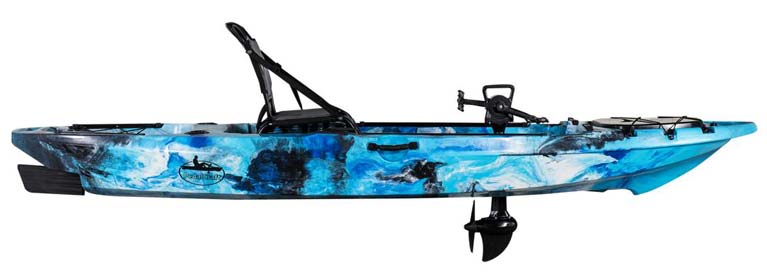 Tarpon 7
Tarpon 7
The Tarpon Propel is equipped with a performance-engineered pedal drive system for hands-free fishing, accessory gear tracks, adjustable seat, hand-controlled rudder and 2 flush mount rod holders. Coming in at 10.5’ long and 33 inches wide this fishing machine is ready for anything!
Come and see these and more at O’Sullivan’s Marine Ireland Fishing Expo stand!
New Bluefin Tuna Catch & Release Programme to Run this Summer
A new scientific catch and release tagging programme for Atlantic bluefin tuna will authorise up to 25 qualifying angling skippers to participate, Inland Fisheries Ireland (IFI) says.
As Afloat reported yesterday, the new Tuna CHART (Catch and Release Tagging) programme run by the IFI and the Marine Institute will open for applications on February 18th, with a closing date of March 6th.
The scientific catch and release fishery will run from July 1st to November 12th this year, and may also operate in 2021 and 2022, IFI says.
A pilot programme last year authorised 15 charter angling vessel skippers, who were trained to tag, measure and record bluefin data.
A total of 219 bluefin tuna were caught, tagged and released during the three months 2019 programme, IFI says.
“ As many as eight bluefins were tagged on one fishing trip,” it says, and “all tuna were carefully handled subject to strict guidelines set by the Tuna CHART programme and all were released alive”.
“Data from the tagging programme is being collated by the partnership, which also involves the Sea Fisheries Protection Authority, the Department of Agriculture, Food and the Marine (DAFM) and the Department of Communications, Climate Action and Environment (DCCAE).
The collated data will be reported to the International Commission for the Conservation of Atlantic Tuna (ICCAT).
Atlantic bluefin tuna is the largest of the species and frequents Irish coastal waters to feed during its annual migration through North Atlantic waters.
“ The bluefin tuna is prized by sea anglers for its power and fighting ability and is a very valuable commercial species,” IFI says.
“The core aspect of the Tuna CHART programme is the welfare and successful release of the bluefin tuna,” it says, and authorised skippers will be required to have high specification rods, reels and line in advance of the open season.
“ Data collection for scientific research is the primary purpose of this fishery and will continue to be a key requirement for skipper participation in this scientific catch-and-release fishery. Skippers will be required to collect data on every bluefin trip undertaken and each bluefin tuna they catch, tag and release,” IFI says.
It says a call for applications for the 2020 fishing season will be announced on February 18th, 2020 and the last date for the receipt of a completed application will be 13:00 on March 6th.
Applications can be made here
Inland Fisheries Ireland Seeks Submissions for Corporate Plan 2020-2025
Inland Fisheries Ireland (IFI), the state agency responsible for Ireland’s inland fisheries, invites submissions for its new Corporate Plan 2020-2025. The consultation process is an opportunity for members of the public to have an input into the formulation of Inland Fisheries Ireland next Corporate Plan, the purpose of which is to provide a strategic framework setting out the vision, policies, values and direction for Inland Fisheries Ireland during the period 2020 – 2025.
The Inland Fisheries Act 2010 requires that Inland Fisheries Ireland shall submit a five year rolling Corporate Plan to the Minister for approval.
Dr Ciaran Byrne, CEO of Inland Fisheries Ireland said: “Inland Fisheries Ireland has a huge jurisdiction with 74,000 kilometres of rivers and streams, 128,000 hectares of lakes and over 5,500 kilometres of coastline. We will utilise the Corporate Plan 2020-2025 to effectively and efficiently deliver on our remit in protecting, managing and conserving our fisheries resource for the future generation. We are asking interested members of the public to submit their input into our next 5-year strategy.”
For any further information and details on how to make a submission please visit here
Irish Anglers Catch Large Fish During 2019
Anglers fishing Irish waters caught hundreds of large fish in 2019 according to the just-published Irish Specimen Fish Committee (ISFC) report.
For the first time in many years, no new records were set but over 500 exceptionally large fish of different species were caught by anglers from venues throughout Ireland in 2019. The main species were smaller shark species like Smooth-hound and Spurdog and in freshwater large Bream and Pike dominated. All fish were caught, weighed, measured and released. From 2020 there will be a new award for the best length-based Specimen, for the fish which represents the greatest percentage of the threshold length for all eligible length-only species.
"For the first time in many years, no new records were set"
Details of all of these fish and the current Irish record fish are in the Irish Specimen Fish Committee Report 2019, which has just been released. The Irish Specimen Fish Committee, which is supported by Inland Fisheries Ireland, is an independent all-Ireland voluntary body which verifies and records the capture of large fish caught on rod by anglers in freshwater and marine waters.
The Irish Specimen Fish Committee report is available on the ISFC website www.irish-trophy-fish.com. Hard copies of the report are available from Inland Fisheries Ireland Citywest office from Friday the 31st of January 2020.
The ISFC Awards Day, when anglers will be presented with their awards and certificates, will be held on the 15th of February 2020 in Dublin.
Meanwhile, anglers both at home and abroad will be reading the report carefully to plan their angling trips to catch the big fish in Ireland in 2020.
Inland Fisheries Ireland has launched its Sponsorship Programme for 2020 and is now inviting applications from suitable angling events and initiatives nationwide. The programme, which is one of the funding mechanisms of Inland Fisheries Ireland, awarded funding to 87 angling events and initiatives across the country during 2019, amounting to a total of €30,000 going towards supporting novice anglers and angling tourism.
Dr Ciaran Byrne, CEO of Inland Fisheries Ireland said: “We are delighted to be able to make financial support available once again in 2020 for projects and events which will support novice and junior anglers and help grow sustainable angling tourism. Our aim is to make angling more accessible to everyone by supporting initiatives which help remove barriers to those looking to try fishing or for younger people who already enjoy the pursuit”.
The Sponsorship Programme 2019 supported 45 angling competitions which showcased Ireland’s angling offering and contribution to local economies and over 800 anglers travelled from outside Ireland to participate in these competitions. A total of 37 Coaching/ Juvenile events were aimed at novice and young anglers with a view to increasing participation in the sport and five public awareness events and angling related initiatives were supported during the past year also. In total, over 600 juvenile and novice anglers participated in these initiatives.
Eligible events and categories for 2020 are as follows (in order of priority):
- Large international competitions held in Ireland which showcase Ireland’s angling and contributes to local economies, supporting jobs and businesses. Maximum of €3,000 per event applies.
- Novice angler events & training courses which increase participation in angling including funding of transport hire for participants to facilitate attendance at novice angler events. Minimum of 20 novice angler participants required. Maximum of €500 per event/course applies.
- Information dissemination/initiatives to promote fisheries awareness/conservation and protection of the inland fisheries and sea angling resource/promotion of angling as a key Irish tourism activity e.g. Production of high-quality angling promotional videos/seminars/coaching/training/workshops etc. Maximum of €1,000 per event applies.
- Juvenile and minority angling teams representing Ireland at international events both home and abroad. Maximum of €500 per team.
Suzanne Campion, Head of Business Development at Inland Fisheries Ireland said: “Our 2020 Sponsorship Programme will play an important role in driving angling participation among novice and junior anglers. The Inland Fisheries Ireland Sponsorship Programme has awarded €30,000 per year over the past seven years to angling clubs and groups nationwide to help in the delivery of local angling events.
“In addition to supporting those who are casting for the first time, we also have a unique opportunity to inform novice anglers in conservation and protection of our precious wild fisheries. The Sponsorship Programme offers clubs and associations an incentive to engage overseas anglers to visit our renowned wild fisheries and to enjoy fishing here in a conservation-focused manner.”
Applications for funding from the Sponsorship Programme are now invited from angling clubs, associations or any local group organising an angling initiative. The programme will remain open for funding applications until the 14th of February 2020 with applications for equipment, staff support and biosecurity assistance available throughout the year.
Awards will be subject to budget availability and adherence to the programme requirements.
To find out more here.



























